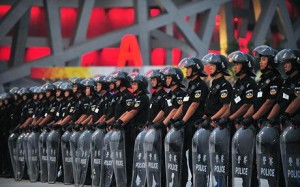China reached an earth-shifting milestone last year when, for the first time in history, more than half of its 1.3 billion people were reported living in cities than in the countryside.
 Clearly this is not as dramatic a movement as the Long March (1934-35), but it could prove equally significant in the epic annals of Chinese history. Not least because hundreds of millions of educated people in combustible cities demanding jobs, welfare benefits, and democratic freedoms are bound to cause more trouble for the ruling Communist Party than hundreds of millions of peasant farmers in the isolated countryside making similar demands, which they have been doing for many years now.
Clearly this is not as dramatic a movement as the Long March (1934-35), but it could prove equally significant in the epic annals of Chinese history. Not least because hundreds of millions of educated people in combustible cities demanding jobs, welfare benefits, and democratic freedoms are bound to cause more trouble for the ruling Communist Party than hundreds of millions of peasant farmers in the isolated countryside making similar demands, which they have been doing for many years now.
This is why, despite a rate of growth that remains the envy of the world, China’s economy is, in fact, a ticking time bomb. Because the 1 billion people providing cheap labor to fuel its boom represent mushrooming fuel demands that portend its bust. Not to mention that cheap labor (as the primary means of production) is going the way of the bicycle (as the primary means of transportation) as these new urban dwellers demand high-paying jobs and greater benefits commensurate with modern, city life.
Here, in part, is how I presaged these combustible developments some time ago:
It’s certainly ironic that the great proletarian revolution Karl Marx predicted for capitalist societies is actually simmering in communist China. Because as urban sprawl supplants rural areas and further alienates peasant farmers (who have seen only hardship from this economic boom), the tensions between the “haves and have nots” will cause China to implode…
[O]ne can get a sense of the powder-keg potential these tensions pose from reports by China’s own ministry of propaganda which confirmed earlier this year that the ‘number of riots has risen sharply in China, reaching more than 70,000 in 2004 and developing into a major concern for the government.’
(“Gap between rich and poor in China is sowing seeds of resentment and terminal unrest,” The iPINIONS Journal, December 22, 2005)
Now, here is what no less a person than U.S. Ambassador to China Gary Locke said just yesterday during an interview with National Public Radio about the potential for unrest in China, which would make the upheaval of the Arab Spring look like a Sunday picnic:
[T]there is a growing frustration among the people over the operations of government, corruption, lack of transparency, and issues that affect the Chinese people on a daily basis that they feel are being neglected… The discord inside China is partly a result of the income and wealth disparity between China’s growing middle class and the masses of poor, rural residents.
[I]t’s very clear that in the run up to the 2008 Beijing Olympics and since then, there’s been a greater intolerance of dissent — and the human rights record of China has been going in the wrong direction.
 But as everyone from Mubarak to Gaddafi found out, once people overcome the fear of oppression, it’s only a matter of time before they are willing to kill (or die) for their freedom.
But as everyone from Mubarak to Gaddafi found out, once people overcome the fear of oppression, it’s only a matter of time before they are willing to kill (or die) for their freedom.
Of course, the sheer number of disenfranchised and dispossessed people affected makes it prohibitive even for the amoral Communist Party to emulate either the Syrian regime by crushing them militarily or the Saudi regime by placating them financially.
This means that instead of the mass non-violent democracy protest that was so easily crushed in 1989, Tiananmen Square 2.0 is bound to be a bona fide, bloody revolution. Which makes the allusion to Jasmine seem like a macabre joke….
Related commentaries:
Gap between rich and poor in China…
China, free Ai Wei Wei…
China’s deficit…